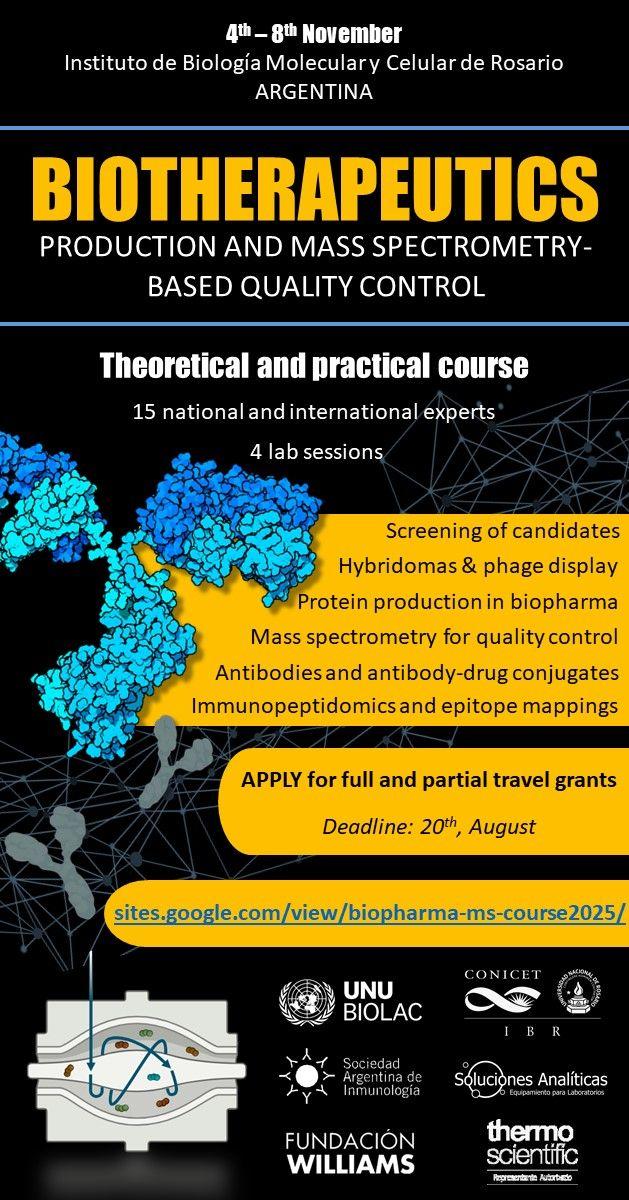Biotherapeutics such as monoclonal antibodies and recombinant proteins have revolutionized modern medicine and are increasingly important for human and animal health. However, access to biologics in Latin America remains limited due to high production costs, scarce local infrastructure, and a shortage of trained personnel. This course responds to a critical need: developing regional capacity in the production and analytical characterization of therapeutic proteins.
This international course will provide participants with an overview of biopharmaceutical production pipelines, from designing and expressing therapeutic proteins in prokaryotic and eukaryotic systems to mass spectrometry-based quality control, emphasizing monoclonal antibodies. The program integrates theoretical lectures and lab demonstrations, offering a unique opportunity to learn from leading experts from Latin America and Europe.
Dates: November 4th to 8th, 2025
Core topics include:
- Recombinant protein production in prokaryotic and eukaryotic systems
- Antibody engineering and structure-function analysis
- Biophysical and MS-based characterization of protein quality and stability
- Detection of post-translational modifications and bioequivalence metrics
- Immunopeptidomics and epitope mapping using intact protein mass spectrometry
- Data analysis workflows for high-resolution MS
Legal and regulatory aspects of biosimilar development
Course format:
Participants will benefit from expert-led lectures and hands-on demonstrations using Orbitrap-based mass spectrometry and discussion sessions. The practical component of the course will guide participants through key steps in mass spectrometry-based analysis of biotherapeutics. Hands-on sessions will cover sample preparation for LC-MS/MS and intact protein analysis, including peptide purification workflows, instrument setup, and mass spectrometer injection protocols. Participants will gain experience in data acquisition and interpretation, focusing on characterizing disulfide bridges and glycosylation patterns, both critical quality attributes in therapeutic protein development.
Hosted by the Mass Spectrometry Unit of the Institute of Molecular and Cellular Biology of Rosario (IBR), the only facility in Argentina currently offering intact protein analysis for biopharmaceuticals, the course invites scientists across Latin America to build capacity in a field critical to public health and regional innovation.Course Objectives:
To build regional capacity in therapeutic protein production and analytical quality control, focusing on monoclonal antibodies and biosimilars.
To provide participants with a theoretical and practical foundation in recombinant protein expression systems (both prokaryotic and eukaryotic) and antibody engineering.
To train participants in using high-resolution mass spectrometry to characterize biotherapeutics, including workflows for intact protein analysis, peptide mapping, and post-translational modification profiling.
To familiarize attendees with the preparation, setup, and interpretation of LC-MS/MS experiments to evaluate critical quality attributes such as glycosylation and disulfide bridges.
To introduce participants to immunopeptidomics and mass spectrometry-based epitope mapping, highlighting their applications in biopharmaceutical research and development.
To raise awareness of legal, regulatory, and technological challenges in the regional development of biosimilars and innovative biologics.
To promote regional collaboration and knowledge exchange by connecting early-career researchers with experts in Latin America and Europe.Visit the course's webpage for full information on program, speakers and registration.
Application procedure
Applications will be received via this form (Google login required)
Interested candidates will be required to submit a motivation letter and a brief CV.
For more information, send your questions to germanlrosano@gmail.com
Last day to apply: August 20th, 2025.

